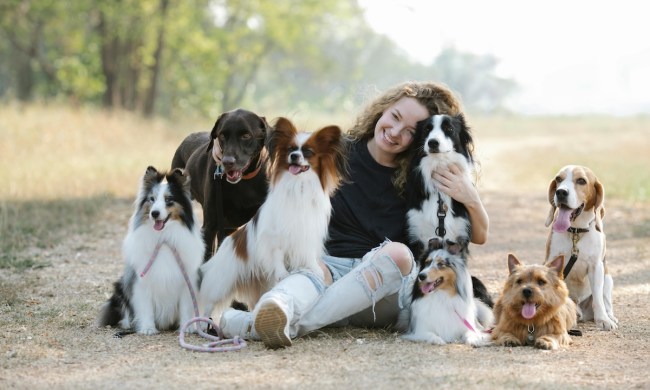A member of the working group, Rottweilers are actually descended from Roman mastiffs. Males range from 24 to 27 inches tall, and females from 22 to 23 inches. Males can weigh anywhere from 95 to 135 pounds, with females weighing 80–100 pounds on average. Rottweilers, affectionately known as Rotties, have a life expectancy of roughly nine to 10 years. Despite their densely muscled form and intimidating appearance, well-trained Rotties are calm, courageous, and fiercely protective guardians of their human families. But are Rottweilers friendly with strangers? More importantly, are Rottweilers aggressive? We’ll get to the bottom of this misunderstood — and often feared — breed.

What you should know before getting a Rottie
Regardless of how much we adore these smart, loyal dogs, Rottweilers are not the best breed for first-time dog owners. Their size and strong prey drive can cause problems for some owners. It’s best to adopt a Rottweiler puppy, which will allow you to help your pooch adjust to life with other animals from the get-go.
That being said, Rotties are remarkably good with children if they’re used to them — and if your kids are old enough to play with your dog gently — and they can be trained to get along well with other pets if you’re willing to put in the time and effort required. Rotties are extremely intelligent and love nothing more than to please their human family members, but they can be excessively hyper as puppies. It’s important to begin training your puppy immediately, and if you don’t have the time, professional obedience training is the way to go.
Are Rotties friendly with strangers?
Rottweilers have a reputation as an aloof and stoic breed, but that’s not always the case. If you’ve never witnessed a Rottie’s playful side firsthand, it might come as a surprise to know Pet ID Register gives Rotties a score of three out of five on the friendliness scale. As it turns out, friendliness isn’t exclusively an innate characteristic. If you expose your dog to different environments and people starting at an early age, your pooch will be much more likely to view strangers as potential friends than possible threats to your safety.
While how you raise your dog is an important factor in how he approaches strangers, every dog is different. If your Rottie comes from a long line of guard dogs, then it’s likely he’ll have heightened protective instincts. Training will help, but some Rotties are naturally more wary around strangers than others. With patience and consistent training, you can teach almost any dog to be friendly around strangers.

How to train your Rottie to be stranger-friendly
According to Wag Walking, it takes roughly one to eight weeks to train your pup to be friendly around strangers. Puppies without a preexisting fear of strangers will be easier to teach, while older Rotties might be more reluctant to spend time around people they don’t know and trust. Fortunately, there are ways to help your pooch adjust. Here’s how.
Make sure he knows basic commands first
Ensure your dog can follow commands like “sit” and “stay” before you invite a guest into your home.
Start off slowly
If this is your dog’s first time around strangers in a new home, he may feel protective of his space. Keep your Rottie on a short leash or martingale collar when a guest enters your home.
Ask guests to pretend your dog isn’t there
Instruct your guest to ignore the dog at first, as this teaches your pup he doesn’t have to interact with strangers unless he chooses to. If your dog shows any signs of aggression, such as raising his hackles or growling, immediately tell him to sit. Using obedience training can help distract your dog from feeling unsettled. Once he calms down, reward good behavior with a treat and lots of praise.
Have your guest throw a treat near the dog
Not only will the treat smell like your guest, strengthening the connection between remaining calm in their presence and being rewarded, but also your dog will begin to associate strangers in general with getting a treat.
Allow your fur baby to interact with your guest
After your dog manages a few calm meet and greets, you can let your guest greet him and give him attention.
Venture out
Now that your dog is more comfortable with strangers in your home, it’s time to visit the dog park. When your dog remains calm around strangers, give him a treat and praise. (Make sure you monitor his food intake on treat-heavy days, or your pooch could pack on the pounds.)
Reinforce his training
If your dog displays aggression while you’re out and about, immediately pull him away and take him home without a treat.
Practice makes perfect
While puppies may warm up to strangers quickly, you’ll probably need to be more patient with older dogs. If necessary, muzzle your dog before allowing him in the company of strangers and be quick to remove him from the situation if he acts out.

Training your Rottweiler to accept strangers can be time-consuming, but it’s ultimately worth the reward. Your dog will not only enjoy daily walks much more when he’s no longer afraid of strangers, but his good behavior also sets a positive example of an often misunderstood breed. With time, patience, and dedication, your Rottie will be friendly with everyone.



